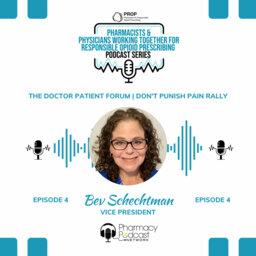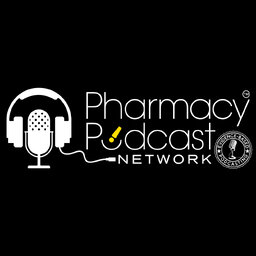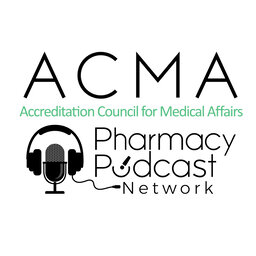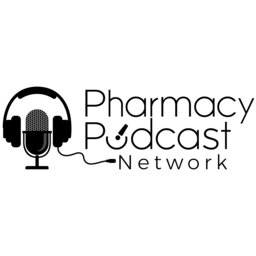The V3 Medical Affairs Podcast with Guest Dr. Darshan Kulkarni - PPN Episode 943
ACMA Podcast
The ACMA is a member of the Pharmacy Podcast Network. The Accreditation Council for Medical Affairs (ACMA)Credible. Trustworthy. The ACMA is the on…Host Dr. Anne Arvizu and Guest Dr. Darshan Kulkarni
SHOW POST:
Hey Medical Affairs Friends: Here's a blow-your-mind scenario. At least for people in Medical Affairs functions like Medical Science Liaisons and Medical Information professionals.
Fact: It's OK for sales reps to discuss, or even 'promote' in some cases the off-label use of a product being marketed by a pharmaceutical company.
It’s apparently not a question. Now before you get upset or disagree, read on and then listen to our discussion on the #V3Podcast. I had no idea that this was even ‘a thing’. However, this is a real interpretation and FDA standpoint that I learned about when speaking with friend, colleague and fellow USP Grad (Philadelphia College of Pharmacy & Science @USciences), Darshan Kulkarni. He's not your average pharmacist – he’s kind-of way above average in terms of specificity of his background, degrees and experience; and like me, he's a senior consultant to our industry, but from a very complimentary vantage point.
Specifically, Darshan is the Principal Attorney of the Kulkarni Law Firm and focuses his practice on helping FDA regulated companies successfully promote their products. He has spent over 20 years advising clients on FDA compliant marketing and has worked as a pharmacist for over a decade. Darshan has experience serving on medical legal regulatory (MLR) boards, in addition to helping companies navigate a variety of privacy-related issues, including HIPAA, GDPR, US state privacy laws and medium-specific laws like the TCPA. He has also written several book chapters on pharmaceutical marketing for publications including Pharmaceutical and Medical Device Law: Regulation of Research, Development, and Marketing.
Darshan shares some pivotal cases that have led to much discussion. So even though Darshan is a PHARMACIST, I give you the warning…he’s also a LAWYER!; (You’ll hear it!) He loves to flip the script, and that’s what makes for a lively, thought provoking, and interesting discussion on a tough topic. It really does take two sides to flesh out this discussion. The verdict for companies after we’ve solved the bio-pharma’s world’s problems? Proceed with caution.
Even though we have two voices here about this topic, there is always so much to still learn.
There is also a lot of room for YOUR voice and opinion on the subject, so if you are an industry professional, have a listen and then comment to us on twitter, linked in or other social media or right below this post.
You can also send comments or questions to support@rxercommunications.com. You’ll be able to download a copy of this transcript on our website, so check back for when it’s ready.
In conclusion, I believe many people in our industry, especially on the medical affairs side are unaware of the depth and legal background behind this nuanced issue – that FDA DOES ALLOW sales reps to discuss what we thought was previously taboo to discuss. So, for your reading pleasure, we are including multiple links and articles that go beyond the typical FDA guidance document, that you and your teams may find helpful to read, review and discuss here.
- Central Hudson Gas & Electric v Public Service Commission
- IMS v Sorrell
- MIWG Citizens Petition I (Attached)
- US v Caronia (District Court)
- US v Caronia (Appellate)
- MIWG Citizens Petition II
- FDA Distributing Scientific Publications on Unapproved New Uses Guidance
- Amarin District Court
- Pacira
- Amarin Settlement Agreement
- FDA Announced Public Hearing
- PhRMA Amicus Brief in US v Facteau
- https://www.healthaffairs.org/do/10.1377/hblog20140619.039649/full/
GUEST BIO:
Dr. Darshan Kulkarni is the Principal Attorney of the Kulkarni Law Firm and focuses his practice on helping FDA regulated companies successfully bring their products to market. He has over 20 years of experience in providing legal, medical, and regulatory services. Darshan has served as a pharmacist for over a decade—making him uniquely well-positioned to help clients through all stages of the development process. He advises clients on issues varying from FDA regulatory strategy, clinical trial negotiations, manufacturing audits, FDA compliant promotional and non-promotional review, FDA responses, to genericization and other interdependent processes.
SHOW NOTES:
In this episode, Anne opens the show explaining the term “unlabeled use.” In the United States, doctors use this all the time. They aren’t going to stop prescribing medicine if a drug will be beneficial to a patient. Darshan poses the question: is label and labeling the same thing? The goal of the FDA is to make sure the products are safe and not misbranded. The label is what is on the bottle. Labeling is anything that goes with the bottle. The term “goes with” is exceptionally broadly defined. Your sales materials can be considered labeling. If your sales rep speaks off label, that’s still part of the labeling of the bottle.
In the early 2000s, the FDA started going after companies about how medical affairs people were going off-label and acting as supercharged salespeople. The industry said that wasn’t true. The medical affairs, people are having a scientific conversation. There are categories of information that are not subject to censorship – such as a political speech. You can’t shut down political speech just because you do not like what they are saying. However, you can shut down two scientists because you do not like what they are saying. The FDA went to court with the pharma companies and lost the first case.
Every so often, people ask why the FDA won’t stop doctors from prescribing off label. The FDA has no jurisdiction over doctors. Prescribing is entirely legal, but off label marketing is not okay. All of the top fines that companies pay are from off label marketing. IMS Health Inc. collected data from people and gave the data to pharma companies. The state of Vermont said they were not able to sell the data because the companies would target the doctors too much, and it might raise the cost of prescribing. The Supreme Court asked: is it truthful and not misleading? Vermont said yes, but there was a cost to it. The Supreme Court said you couldn’t stop people from saying something simply because there will be a cost to it.
So what constitutes truthful and not misleading? To claim the FDA, you need randomized controlled studies – substantial evidence. If you want to make health economics claims, it does not require significant evidence. No one knows the difference between truthful and not misleading. Another case came up: United States v. Caronia. Ex-Orphan Medical sales rep Alfred Caronia successfully argued to a court that the First Amendment gives him a right to promote drugs for uses not approved by the FDA. The critical thing to look at is the role a person will play in a particular context – are they playing a salesperson or a physician?
Stay tuned to hear Dr. Darshan Kulkarni explain why we need medical affairs, the future of our industry, and why the industry is pushing back against the FDA.
In this Episode, topics are presented at the approximate times:
- About unlabeled uses [ 2:50 ]
- About Dr. Kulkarni [ 5:30 ]
- The difference between label and labeling [ 9:30 ]
- Cases from the FDA [ 12:50 ]
- Misbranding [ 17:45 ]
- Presenting new data [ 20:50 ]
- IMS Health Inc. v. Sorrell [ 22:50 ]
- United States v. Caronia [ 27:00 ]
- Sales reps can speak off label [ 40:00 ]
- Why keep medical affairs? [ 43:30 ]
- The future of our industry [ 50:00 ]
- About guidance documents [ 53:00 ]
Quotes:
- “At this moment, a sales rep can speak off label – there’s nothing to stop them.” - Dr. Darshan Kulkarni
- “I don’t see big pharma changing.” -Dr. Darshan Kulkarni
- “I shouldn’t be limited whether I’m in a company (as a direct employee), or out of a (Pharma) company (as a contractor, consultant, service provider or even as a patient) to state what is right.” -Dr. Anne Arvizu
- “No one knows what truthful and not misleading means.” -Dr. Darshan Kulkarni
Links Mentioned:
- Darshan Talks: https://www.darshankulkarni.com/podcasts/
- Darshan’s Newsletter: https://www.darshankulkarni.com/newsletter/
- Darshan’s Twitter: https://twitter.com/darshantalks
- Darshan’s Instagram: https://www.instagram.com/darshantalks/
- Darshan’s LinkedIn: https://www.linkedin.com/in/darshankulkarni/
- IMS Health Inc. v. Sorrell: https://www.oyez.org/cases/2010/10-779
- United States v. Caronia: https://harvardlawreview.org/wp-content/uploads/pdfs/vol127_united_states_v_caronia.pdf
Other Resources:
For medical affairs consulting, visit: https://rxercommunications.com/
For more about Anne, visit: https://annearvizu.com/For more information about the ACMA to become board certified in Medical Affairs visit:
https://training.medicalaffairsspecialist.org/affiliate_page.aspx?unm=anne.aflt.arvizu
To listen to other podcasts on the Pharmacy Podcast Nation, our flagship home on the Pharmacy Podcast Network, subscribe on iTunes or visit: http://pharmacypodcast.com/
In 2 playlist(s)
Pharmacy Podcast Network
The Pharmacy Podcast Network (PPN) is the world's largest network of podcasts dedicated to the pharm…Social links
Follow podcast
Recent clips

Where's the Patient's Voice in Evidence-based Treatment & Research? | Pharmacist and Physician Opioid Collaborative
1:00:11

Pharmacists Answering the call | Pharmacy Podcast Nation
56:55

Ja'Miera Stuart PharmD | Brighter Horizons
19:30
 Pharmacy Podcast Network
Pharmacy Podcast Network
